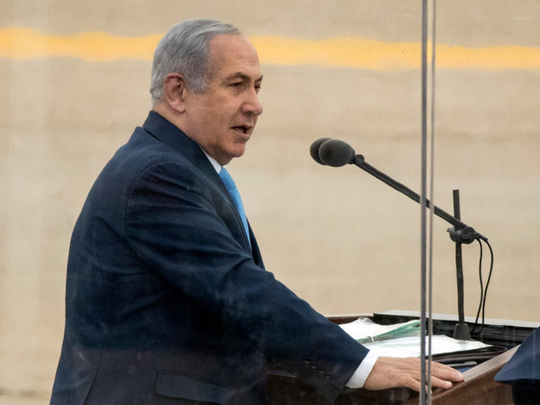
Four different views appeared in the Israeli press following United States President Donald Trump’s recognition of occupied Jerusalem as the capital of Israel. The first group warned about triggering a fresh conflict that could eliminate all chances of a resumption of peace negotiations. The second focused on the political aspect and whether Trump was forced to declare it. A third praised the move, mainly the writers on the extreme-right. A fourth group considered that Trump offered Israel a poisonous gift, but with his mentality of a businessman, he might ask to be offered something in return. Examples of these groups are numerous, but three on each will merely be mentioned.
Chemi Shalev, representing the first group wrote: “This decision could ignite a local and regional fire that would harm American and Israeli interests in the Middle East, which could lead to violence that would undermine the institutions of the Palestinian National Authority, which invested a lot in developing their relations with Trump. This decision can shed the blood of so many people.” Nir Hasson said: “There is fear that the political insult will be translated into a religious insult, which can ignite a great fire. Trump’s words about the need to maintain the status quo in the holy sites will not quell the flames.” Eitan Haber referred to the significance and impact of religious symbols, saying: “The outcome could be destructive — maybe deterioration into violence and war. Yet, nothing may happen and life may continue with its course, and I hope so. But since we have always been very good students of history, we need to learn from it: Wars do not only break out because of border disputes, but also over symbols and images and there are no stronger or more disputed symbols and images than those of [occupied] Jerusalem.”
An editorial in Israeli daily Haaretz, reflecting the position of the second group noted that “the decision ignores the Palestinian aspirations and does not rise up to the hopes to resolve the conflict”. The newspaper concluded: “It is not clear how President Trump looks to resolve the long conflict between the Israelis and the Palestinians and match it with unilateral steps favouring one side only, especially on such a central and volatile issue.” On his part, Tsevi Bareil wrote: “Trump should have clarified about what [occupied] Jerusalem he is talking about,” adding that “If he also declared that he recognises the original area of Jerusalem, which has been annexed to the capital of Israel, he then, brings an end one of the empty political conflicts that accompanied Israel since the Six-Day War.” Bareil added: “Trump will decide and Israel will collect the fragments ... we should admit that Trump did not kill the peace process but stood on its grave, boasting that he was the one who dared to declare its demise.” Along the same line, political analyst Aviad Kleinberg wondered about “the emerging question in the recognition of [occupied] Jerusalem as the capital of Israel”, and “what is the worth of this symbol to us?” “Practically nothing will change after moving the American embassy, for example. The United States’ position towards Israel will not be any better than [what] it is now,” he said.
The third group, whose views were widely read in the ultra-right-wing Israeli daily, Israel Today (usually reflects Israeli Prime Minister Benjamin Netanyahu’s position), welcomed Trump’s decision. For example, Yoram Ettinger wrote: “Failure to transfer the embassy is interpreted as an American surrender to Arab pressure, fear of terrorism, and adoption of European weakness, in the shadow of erosion in the American deterrence, which is critical to American national security and the stability of the world.” Meir Uzieli in Maariv wrote: “What has prevented the American embassy from moving to [occupied] Jerusalem so far is the fear of terrorism, and it also directs our steps,” He added “Trump came to break this barrier and proceed from logic and principles”, he said. Israeli President Ruben Rivlin wrote an article saying: “I think there is no more beautiful and fitting gift than this at the end of the 70th anniversary of the establishment of the State of Israel”. “It is time to bring peace to [occupied] Jerusalem and bring hope to the capital of Israel, to which all people from all over the world are being driven”, he added.
The fourth group saw the likes of military analyst Ron Ben Yishai expressing, “the goal of the Trump declaration is probably to prepare for the possibility of later declaring things that are more particularly pleasing to the Palestinians, and then Israel will have to swallow what he says silently because it has already got what it wanted”. A whole generation in Palestine waited for long years to see a peace process to be achieved, but Trump hastened to destroy hope. The Palestinians have nothing more to lose. The occupation continues, as well as the colonisation of land, demolition of homes, killings, and the position of Jerusalem is at stake. The Israelis are working fast to expand its borders to reach the Dead Sea in the east. The question remains: What if the Palestinians decide to stand up?
Professor As’ad Abdul Rahman is the chairman of the Palestinian Encyclopaedia.












